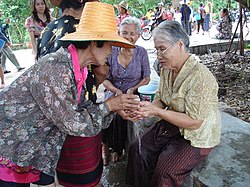Thai New Year
| Songkran | |
|---|---|

New Year celebration, Rot Nam Dam Hua, a traditional way to celebrate with elders. Most Thai people go back to their hometowns to meet their elders.
|
|
| Official name | Songkran Festival |
| Observed by | Thai and Malaysian Siamese |
| Significance | Marks the Thai New Year |
| Begins | 13 April |
| Ends | 15 April |
| Date | 13 April |
| 2016 date | 13 April, Monkey |
| 2017 date | 13 April, Rooster |
| 2018 date | 13 April, Dog |
| Frequency | Annual |
| Related to | Burmese New Year, Lao New Year, Odiya New Year, Tamil New Year, Cambodian New Year, Sinhalese New Year, Tai Khamti New Year, Dai New Year |
The Songkran festival (Thai: เทศกาลสงกรานต์, pronounced [tʰêːt.sā.kāːn sǒŋ.krāːn]) is the Thai New Year's festival. The Thai New Year's Day is 13 April every year, but the holiday period includes 14–15 April as well. The word "Songkran" comes from the Sanskrit word saṃkrānti (Devanāgarī: संक्रांति), literally "astrological passage", meaning transformation or change. The term was borrowed from Makar Sankranti, the name of a Hindu harvest festival celebrated in India in January to mark the arrival of spring. It coincides with the rising of Aries on the astrological chart, the New Year of many calendars of South and Southeast Asia. The festive occasion is in keeping with the Buddhist/Hindu solar calendar.
The Songkran celebration is rich with symbolic traditions. Mornings begin with merit-making. Visiting local temples and offering food to the Buddhist monks is commonly practiced. On this specific occasion, performing water pouring on Buddha statues is considered an iconic ritual for this holiday. It represents purification and the washing away of one's sins and bad luck. As a festival of unity, people who have moved away usually return home to their loved ones and elders. As a way to show respect, younger people often practice water pouring over the palms of elders' hands. Paying reverence to ancestors is also an important part of Songkran tradition.
The holiday is known for its water festival which is mostly celebrated by young people. Major streets are closed for traffic, and are used as arenas for water fights. Celebrants, young and old, participate in this tradition by splashing water on each other. Traditional parades are held and in some venues "Miss Songkran" is crowned.” where contestants are clothed in traditional Thai dress.
...
Wikipedia
